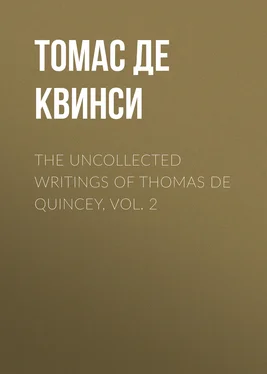Томас Де Квинси - The Uncollected Writings of Thomas de Quincey, Vol. 2
Здесь есть возможность читать онлайн «Томас Де Квинси - The Uncollected Writings of Thomas de Quincey, Vol. 2» — ознакомительный отрывок электронной книги совершенно бесплатно, а после прочтения отрывка купить полную версию. В некоторых случаях можно слушать аудио, скачать через торрент в формате fb2 и присутствует краткое содержание. Жанр: foreign_prose, literature_19, foreign_antique, на английском языке. Описание произведения, (предисловие) а так же отзывы посетителей доступны на портале библиотеки ЛибКат.
- Название:The Uncollected Writings of Thomas de Quincey, Vol. 2
- Автор:
- Жанр:
- Год:неизвестен
- ISBN:нет данных
- Рейтинг книги:3 / 5. Голосов: 1
-
Избранное:Добавить в избранное
- Отзывы:
-
Ваша оценка:
- 60
- 1
- 2
- 3
- 4
- 5
The Uncollected Writings of Thomas de Quincey, Vol. 2: краткое содержание, описание и аннотация
Предлагаем к чтению аннотацию, описание, краткое содержание или предисловие (зависит от того, что написал сам автор книги «The Uncollected Writings of Thomas de Quincey, Vol. 2»). Если вы не нашли необходимую информацию о книге — напишите в комментариях, мы постараемся отыскать её.
The Uncollected Writings of Thomas de Quincey, Vol. 2 — читать онлайн ознакомительный отрывок
Ниже представлен текст книги, разбитый по страницам. Система сохранения места последней прочитанной страницы, позволяет с удобством читать онлайн бесплатно книгу «The Uncollected Writings of Thomas de Quincey, Vol. 2», без необходимости каждый раз заново искать на чём Вы остановились. Поставьте закладку, и сможете в любой момент перейти на страницу, на которой закончили чтение.
Интервал:
Закладка:
Now, our case, as regards Chinese land in the tea districts, is far beyond this. Not only has it been large enough to benefit the landholder enormously, by calling out lower qualities of land, which process again has stimulated the counteracting agencies in the more careful and scientific culture of the plant; but also it has been in a positive sense enormous. It might have been large relatively to the power of calling out lower qualities of soil, and yet in itself have been small; but our demand, running up at present to 100,000,000 pounds weight annually, is in all senses enormous. The poorer class of Chinese tea-drinkers use the leaves three times over— i. e. , as the basis of three separate tea-makings. Consequently, even upon that single deduction, 60,000,000 of Chinese tea-drinkers count only as 20,000,000 of ours. But I conclude, by repeating that the greatest of the impressions made by ourselves in the China tea districts, has been derived from this—that, whilst the native demand has probably been stationary, ours, moving by continual starts forward, must have stimulated the tea interest by continual descents upon inferior soils.
There is no doubt that the Emperor and all his arrogant courtiers have decupled their incomes from the British stimulation applied to inferior soils, that but for us never would have been called into culture. Not a man amongst them is aware of the advantages which he owes to England. But he soon would be aware of them, if for five years this exotic demand were withdrawn, and the tea-districts resigned to native patronage. Upon reviewing what I have said, not the ignorant and unteachable Chinese only, but some even amongst our own well-informed and reflecting people, will see that they have prodigiously underrated the commercial value of England to China; since, when an Englishman calls for a hundred tons of tea, he does not (as is usually supposed) benefit the Chinese merchant only by giving him the ordinary profit on a ton, repeated for a hundred times, but also infallibly either calls into profitable activity lands lying altogether fallow, or else, under the action of the rent laws, gives a new and secondary value to land already under culture.
Other and greater topics connected with this coming Chinese campaign clamorously call for notice: especially these three:—
First, the pretended literature and meagre civilisation of China—what they are, and with what real effects such masquerading phantoms operate upon the generation with which accidents of commerce have brought us connected.
Secondly, what is the true mode of facing that warfare of kidnapping, garotting, and poisoning, avowed as legitimate subjects of patronage in the practice and in the edicts of the Tartar Government? Two things may be said with painful certainty upon this subject: first, the British Government has signally neglected its duties in this field through a period of about ninety years, and apparently is not aware of any responsibility attaching in such a case to those who wield the functions of supreme power. Hyder Ali, the tiger, and his more ferocious son Tippoo, practised, in the face of all India, the atrocities of Virgil's Mezentius upon their British captives. These men filled the stage of martial history, through nearly forty years of the eighteenth century, with the tortures of the most gallant soldiers on earth, and were never questioned or threatened upon the subject. In this nineteenth century, again, we have seen a Spanish queen and her uncle sharing between them the infamy of putting to death (unjudged and unaccused) British soldiers on the idlest of pretences. Was it then in the power of the British Government to have made a vigorous and effectual intercession? It was; and in various ways they have the same power over the Chinese sovereign (still more over his agents) at present. The other thing which occurs to say is this: that, if we do not interfere, some morning we shall probably all be convulsed with unavailing wrath at a repetition of Mr Stead's tragic end, on a larger scale, and exemplified in persons of more distinguished position.
Finally, it would have remained to notice the vast approaching revolution for the total East that will be quickened by this war, and will be ratified by the broad access to the Orient, soon to be laid open on one plan or other. Then will Christendom first begin to act commensurately on the East: Asia will begin to rise from her ancient prostration, and, without exaggeration, the beginnings of a new earth and new heavens will dawn.
SHAKSPERE'S TEXT.—SUETONIUS UNRAVELLED
Dear Sir,—A year or two ago, 7 7 Written in 1856. H.
I received as a present from a distinguished and literary family in Boston (United States), a small pamphlet (twin sister of that published by Mr Payne Collier) on the text of Shakspere. Somewhere in the United States, as here in England, some unknown critic, at some unknown time, had, from some unknown source, collected and recorded on the margin of one amongst the Folio reprints of Shakspere by Heminge & Condell, such new readings as either his own sagacity had summarily prompted, or calm reflection had recommended, or possibly local tradition in some instances, and histrionic tradition in others, might have preserved amongst the habitués of a particular theatre. In Mr P. Collier's case, if I recollect rightly, it was the First Folio ( i. e. , by much the best); in this American case, I think it is the Third Folio (about the worst) which had received the corrections. But, however this may be, there are two literary collaborateurs concerned in each of these parallel cases—namely, first, the original collector (possibly author) of the various readings, who lived and died probably within the seventeenth century; and, secondly, the modern editor, who stations himself as a repeating frigate that he may report and pass onwards these marginal variations to us of the nineteenth century.
Cor. for Corrector , is the shorthand designation by which I have distinguished the first ; Rep. for Reporter designates the other. My wish and purpose is to extract all such variations of the text as seem to have any claim to preservation, or even, to a momentary consideration. But in justice to myself, and in apology for the hurried way in which the several parts of this little memorandum are brought into any mimicry of order and succession, I think it right to say that my documents are all dispersed into alien and distant quarters; so that I am reduced into dependence upon my own unassisted memory.
[The Tempest. Act I. Scene 1.
'Not a soul
But felt a fever of the mad, and play'd
Some tricks of desperation.'
Cor. here substitutes, 'But felt a fever of the mind :' which substitution strikes me as entirely for the worse; 'a fever of the mad' is such a fever as customarily attacks the delirious, and all who have lost the control of their reasoning faculties.
[ Ibid.
'O dear father,
Make not too rash a trial of him; for
He's gentle, and not fearful.'
Upon this the Reporter's remark is, that 'If we take fearful in its common acceptation of timorous , the proposed change renders the passage clearer;' but that, if we take the word fearful in its rarer signification of that which excites terror , 'no alteration is needed.' Certainly: none is needed; for the mistake (as I regard it) of Rep. lies simply in supposing the passive sense of fearful —namely, that which suffers fear—to be the ordinary sense; which now, in the nineteenth century, it is; but was not in the age of Shakspere.
Читать дальшеИнтервал:
Закладка:
Похожие книги на «The Uncollected Writings of Thomas de Quincey, Vol. 2»
Представляем Вашему вниманию похожие книги на «The Uncollected Writings of Thomas de Quincey, Vol. 2» списком для выбора. Мы отобрали схожую по названию и смыслу литературу в надежде предоставить читателям больше вариантов отыскать новые, интересные, ещё непрочитанные произведения.
Обсуждение, отзывы о книге «The Uncollected Writings of Thomas de Quincey, Vol. 2» и просто собственные мнения читателей. Оставьте ваши комментарии, напишите, что Вы думаете о произведении, его смысле или главных героях. Укажите что конкретно понравилось, а что нет, и почему Вы так считаете.












